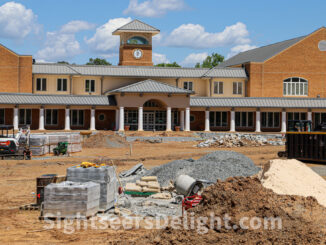ATLANTA – Hurricane Helene moved out of Georgia Friday morning, leaving in its wake 11 dead, toppled trees that caused widespread power outages and massive flooding.
The storm took a different path than had been anticipated, Gov. Brian Kemp told reporters during a late-morning briefing at the State Operations Center in Southeast Atlanta. Rather than heading straight north out of the Valdosta area, Helene veered northeast to Augusta, leaving West Georgia with less damage than had been expected.
“We caught a little bit of a break for some parts of the state,” Kemp said.
But the corridor from Valdosta to Augusta suffered extensive damage, with hurricane-force winds of up to 100 miles an hour reported in Alma, Kemp said.
First responders are working to rescue people trapped inside their homes, Kemp said. One of those killed was a first responder, the governor said.
“One of our finest has lost his life trying to save others,” he said.
Flooding is so extensive in Northeast Georgia that authorities ordered a release of water at Lake Rabun. Homes downstream from the reservoir are being evacuated, said Chris Stallings, director of the Georgia Emergency Management and Homeland Security Agency.
Some of the worst property damage occurred in the Valdosta area, with 115 structures heavily damaged. Kemp said the South Georgia Medical Center in Valdosta is without power because its emergency generator was hit by a fallen tree.
“Our priority is getting to medical facilities that need help and don’t have power,” Kemp said.
The state Department of Transportation reported at least 152 road closures, including stretches of Interstate 16 in Laurens County and I-20 in McDuffie County.
The ports of Savannah and Brunswick are operating but with limited service, Kemp said.
Georgia Power and the state’s Electric Membership Corporations (EMCs) reported more than 1.1 million without power as of late Friday morning.
Seventeen shelters were open across the state housing 1,100 people, the governor said.
Georgia Commissioner of Agriculture Tyler Harper said farms and ranches east of Interstate 75 suffered significant damage, including flattened poultry houses and damage to row and nut crops. He said farmers and ranchers must document their losses in order to receive state and federal assistance.
“We need as much information as possible to make sure we get the needed resources,” Harper said.
Maj. Gen. Richard Wilson, commander of the Georgia National Guard, said about 500 soldiers and airmen have been deployed across the state to help clear debris and transport critical supplies including generators, food, and water to areas in need.
Kemp said the damage is so extensive it will take time to assess the extent. But he said the widespread nature of the damage recalled Hurricane Michael, which roared through South Georgia in 2018.
“This is going to be monetary-wise as big or bigger than Michael,” he said.
Kemp urged Georgians not to take unnecessary trips and, if they do go out, to watch out for fallen trees and flooded roads.
“Try to give us a little bit of space out there,” he said. “We’ve got a lot of work to do.”
— Dave Williams
This article was published by Capitol Beat News Service, a nonprofit news service operated by the Georgia Press Educational Foundation. Content is available free of charge for Georgia newspaper editors and publishers to include in their print and digital products. Click here to view the original.





